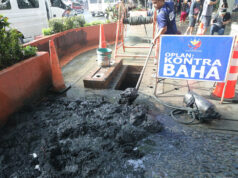Senator to pursue higher tax on tobacco than in TRAIN
By Arjay L. Balinbin
THE FIGHT for a higher excise tax rate on cigarettes is not over, despite its “unexpected” inclusion in the ratified version of the first package of the Tax Reform for Acceleration and Inclusion (TRAIN) bill, according to Senator Joseph Victor G. Ejercito, chairman of the Senate committee on health and demography.
In a text message on Sunday, Dec. 17, Mr. Ejercito said that “definitely” he will continue pushing for a higher tobacco tax, adding that he expects “a hearing in January” on Senate Bill 1605 which he filed in November and which seeks to increase the excise tax on cigarettes to P90 in 2018, followed by a 9% increase per year from 2019 onwards.
In the ratified version of the tax reform measure, the excise tax on tobacco was raised from the current P30 per pack. Starting January to June 2018, the excise tax will increase to P32.50; between July 2018 and December 2019, it will rise to P35. Between 2020 and 2021, the tax rate is P37.50, rising to P40 between 2022 and 2023. The tax will ratchet up 4% annually from 2023 onwards.
According to Mr. Ejercito, “the insertion of the tobacco tax in TRAIN during the bicam was unexpected.”
“It was agreed upon during the period of amendments that the tobacco tax will be included in the package 2,” Mr. Ejercito said, adding that his proposed rate for tobacco products in the TRAIN bill was “P60 per pack.”
“They must have anticipated this and included it (as) a very low rate,” the senator claimed.
In an interview with DWIZ on Saturday, Dec. 16, Mr. Ejercito explained that he almost voted “no” to the TRAIN during its ratification last Dec. 13.
“Nagsalita nga ako na almost on a no, because of my disappointment dahil nga po d’yan sa pagkaka-insert ng tobacco tax doon sa bicam kasi ang punto ko dito I was worried sa inflation, so sabi ko sa halip na itaas natin ’yung petroleum at ’yung sa beverage tax which may cause for inflation, dito na lang natin bawiin dahil there is room for tobacco tax to be increased, dito na lang natin ito i-insert kasi basic commodity ang petroleum at beverage kaya lang sabi nga ni Senator (Sonny) Angara hindi ito napag usapan, hindi nagkaroon ng hearing in particular under TRAIN, kaya sabi nya kung pwede sa package 2 na lang, so pumayag ako,” Mr. Ejercito said.
(I almost said “no” due to my disappointment over the insertion of the tobacco tax in the bicameral conference committee report. My point here is that I was worried about the inflation, so I suggested that instead of increasing the excise tax rate on petroleum and sugar-sweetened beverages, we just take it from tobacco because there is still room to increase its tax rate. However, Senator Juan Edgardo M. Angara, the chairman of the Senate committee on ways and means, said there was no hearing conducted on the tobacco tax. He asked if it could be included in the second package, so I agreed.)
“I did not see this coming na bigla itong naisingit ang problema dito napakababa (that I was surprised that it was included, and the problem here is that the rate is too low),” Mr. Ejercito added.
For its part, the Philippine Tobacco Growers Association (PTGA) objected to the new excise tax rate on tobacco, citing its possible burden on tobacco farmers.
“It’s a sad Christmas for tobacco farmers and our families, thanks to the huge cigarette excise tax gift we got from Congress,” said PTGA in a statement released last week after the ratification of the bicam-approved TRAIN bill where the tobacco tax was inserted.
“Our appeal to our representatives to give our industry a respite from successive tax hikes has fallen on deaf ears. Our production has seen a significant drop from 68 million kilograms (kg) in 2013 to 52 million kg in 2015 and this alarming trend would only get worse with this massive 16% increase beginning Jan. 1. As we struggle with reduced demand, we hope we will get the support we need for the livelihood of our farmers and their communities,” PTGA added.



